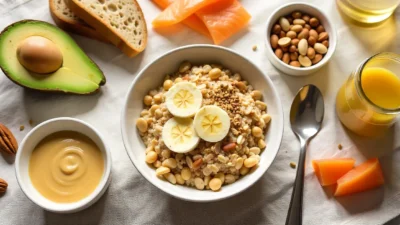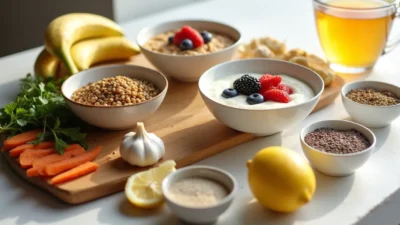Contents
“Gut health” — you’ve probably seen the phrase everywhere lately, from wellness podcasts to supermarket labels. But beyond the hype and hashtags, what does it really mean? And why does everyone seem to care so much?
At its core, gut health isn’t a trend. It’s a reflection of how well your digestive system — and the trillions of microbes living inside it — are working to support your whole body. Yes, your whole body. Your gut isn’t just about digestion; it’s deeply connected to your immune system, hormones, skin, mood, sleep, and energy levels. When your gut is balanced, you feel it — calm digestion, steady energy, clear mind. When it’s not, the signs show up in surprising places: belly discomfort, food sensitivities, fatigue, stress, even breakouts.
Inspired by the practical and research-based perspective of BBC Good Food, this guide breaks down gut health in a way that’s friendly, grounded, and actually usable — without getting lost in complicated science or miracle claims.
Because good gut health isn’t about extremes.
It’s about balance, diversity, and everyday habits that gently support your body, one meal and one breath at a time.
Let’s explore what gut health really means — and how to nourish the inner world that quietly takes care of you every single day. 🌿✨
What “Gut Health” Really Means
When we talk about gut health, we’re really talking about a vibrant, living ecosystem inside you. Your gut isn’t just a tube that digests food — it’s a highly intelligent network made up of:
- Your microbiome — trillions of bacteria, fungi, and microbes
- Your gut lining — the protective barrier that keeps nutrients in and unwanted substances out
- Your enteric nervous system — sometimes called the “second brain”
- Immune cells — nearly 70% of your immune system lives here
Together, these systems communicate constantly with the rest of your body. They help decide how you digest food, absorb nutrients, regulate inflammation, manage stress hormones, and even influence mood and cravings. Pretty remarkable, right?
Your microbiome works best when there’s balance and diversity — meaning lots of different “good” bacteria coexisting peacefully. These microbes help break down food, produce vitamins, and send feel-good signals along the gut-brain axis.
When balance shifts — due to stress, lack of fiber, too much ultra-processed food, disrupted sleep, certain medications, or illness — the gut can become less resilient. This isn’t about perfection or “good vs bad foods,” but about how consistently we nourish the gut environment.
Signs your gut may be thriving might look like:
- Comfortable digestion
- Steady energy
- Strong immunity
- Clear, stable mood
When things feel off, you might notice:
- Bloating or discomfort
- Irregular bowel habits
- Food sensitivities
- Fatigue and foggy thinking
- Skin flare-ups or breakouts
Gut health isn’t a diagnosis — it’s a relationship between what you eat, how you live, how you rest, and how your body feels. And like any relationship, small acts of care make a big difference over time.
Key Factors That Affect Gut Health
Your gut isn’t shaped by one thing — it’s shaped by your everyday rhythm. The food you eat, how you sleep, how often you move, and even how stressed you feel all send messages to your microbiome. Think of the gut as a garden: what you plant, how often you water it, and the environment around it all matter.
Food is a major player. Diets rich in colorful vegetables, whole grains, beans, fruit, herbs, and healthy fats help feed beneficial microbes and support a strong gut lining. On the other hand, a pattern heavy in ultra-processed foods, artificial sweeteners, and low-fiber meals can leave your microbiome under-nourished. It’s less about “good” vs “bad” and more about balance and consistency.
Stress is another quiet gardener. The gut and brain are in constant conversation through the vagus nerve, which means long-term stress can change digestion, appetite, and microbiome diversity. Ever felt butterflies before a big moment or lost your appetite when anxious? That’s your gut-brain axis at work.
Sleep & movement also play powerful roles. Deep, restorative sleep gives the digestive system time to repair, while gentle daily activity — from walking to yoga to strength training — boosts digestion and feeds healthy microbes by improving circulation and metabolism.
Medications and lifestyle history matter, too. Antibiotics can be lifesaving, but they can also temporarily disrupt the microbiome. Highly sanitized environments, chronic inflammation, aging, and digestive illnesses can change the gut’s landscape in different ways.
None of these factors work alone — they interact and shape the gut ecosystem over time. The encouraging part?
Even small improvements in diet, stress support, and daily routine can slowly shift your microbiome toward better balance and resilience.
Foods & Habits That Support a Healthy Gut
A well-nourished gut doesn’t need complicated superfoods or strict rules — it thrives on variety, fiber, and gentle consistency. Every meal is a chance to feed your inner ecosystem, and often the simplest ingredients are the most powerful.
Start with fiber-rich plants — the quiet heroes of gut health. Whole grains, beans, lentils, oats, fruit, vegetables, nuts, and seeds act like fuel for beneficial bacteria. They ferment these fibers to produce short-chain fatty acids, which support your immune system and gut lining. Think of fiber as soil for your microbiome garden.
Then add fermented foods, nature’s probiotics. Yogurt, kefir, sauerkraut, kimchi, miso, tempeh, kombucha — these foods introduce friendly microbes and can help increase diversity in the gut. Start slowly if these are new to you; even a spoonful a day can be a meaningful beginning.
Prebiotic foods — like garlic, onions, asparagus, leeks, bananas, and whole oats — give existing good bacteria something to thrive on. A sprinkle of spring onions over dinner or a banana with breakfast counts more than you think.
But gut support isn’t only about what you add — it’s also about how you eat and live:
- Chew slowly to support digestion from the first bite
- Drink enough water to keep things moving smoothly
- Move your body daily — even gentle walking improves digestion
- Create a calming evening routine — stress can change gut function in hours
- Prioritize sleep so your gut has time to restore and repair
And rather than fearing processed foods entirely, focus on crowding in whole foods. For example, add leafy greens to pasta, choose whole-grain bread when you can, or stir yogurt into your morning berries. Small upgrades, repeated often, create more benefit than a sudden, short-lived “perfect” diet.
Gut health is not about restriction — it’s about nourishment, diversity, and rhythm. With each colorful plate, each mindful bite, each deep breath, you feed not just your microbiome but your whole sense of well-being.
Easy First Steps to Improve Your Gut Health
The path to a healthier gut doesn’t need to look like a complete lifestyle overhaul. In fact, the most powerful changes are often the simplest ones — the tiny habits that slip naturally into your day and slowly shift your inner ecosystem toward balance and comfort.
Think of this stage as cultivating, not fixing. You’re feeding life inside you — gently, steadily, and with curiosity.
Start with one plant-powered boost per meal: a handful of spinach in your eggs, berries on oatmeal, a spoon of beans in your soup, herbs sprinkled over dinner. Every extra color and texture is food for your microbes.
Choose one fermented addition most days — a spoonful of yogurt, a splash of kefir in a smoothie, a forkful of sauerkraut on the side. This isn’t a race; even tiny doses give friendly bacteria a doorway into your routine.
Let hydration be your quiet ally. A glass of water before coffee, herbal tea in the afternoon, warm water with lemon in the evening — fluid keeps digestion smooth and supports the gut lining.
Give your meals space. Try to sit, pause, and chew — digestion starts in the mouth, and a calmer pace helps your stomach and microbiome do their jobs without strain.
And as for movement? Start small. A 10-minute walk after eating, gentle stretching before bed, a slow breath before you stand up from your desk — each moment encourages circulation, motility, and ease in your gut.
You don’t need to chase perfection to feel better.
Begin with one change you can truly keep — then let the next one come naturally. Over time, these choices stack, like stepping stones toward energy, comfort, and a quieter nervous system.
When Gut Health Needs Extra Care
Even with nourishing habits, there are moments when your gut speaks a little louder — asking for more attention, more support, or a professional eye. Gut health is deeply personal, and sometimes symptoms are a whisper; other times they linger long enough to feel like a shadow over your daily life.
If you’ve been eating well, moving gently, resting more, and still feel uncomfortable, it isn’t a failure — it’s simply information. The body has layers, and sometimes we need guidance to understand them.
Pay attention if you notice patterns like:
- Persistent bloating or cramping
- Ongoing constipation or diarrhea
- Regular heartburn or reflux
- Unexplained fatigue or brain fog
- Skin flare-ups that don’t match your routine (eczema, acne, rashes)
- Frequent illness or weak immunity
- Noticeable changes in appetite or digestion over time
These signs don’t always mean something serious — they’re simply signals that your digestive system may be overwhelmed, inflamed, or out of rhythm.
A doctor, registered dietitian, or gut-focused specialist can help explore things like food sensitivities, microbiome imbalances, IBS, stress-related gut effects, or nutrient deficiencies. Sometimes, lifestyle adjustments are enough; other times a personalized plan or testing brings clarity and relief.
And remember — your gut listens to your emotions, too. Long-term stress and unresolved tension move through the digestive system like a quiet storm. Support can look like therapy, journaling, mindfulness, body-based stress release, or even slowing the pace of your day.
Seeking help isn’t a sign that your body is broken.
It’s an act of partnership — a way of saying, “I’m listening. Let’s heal.”









